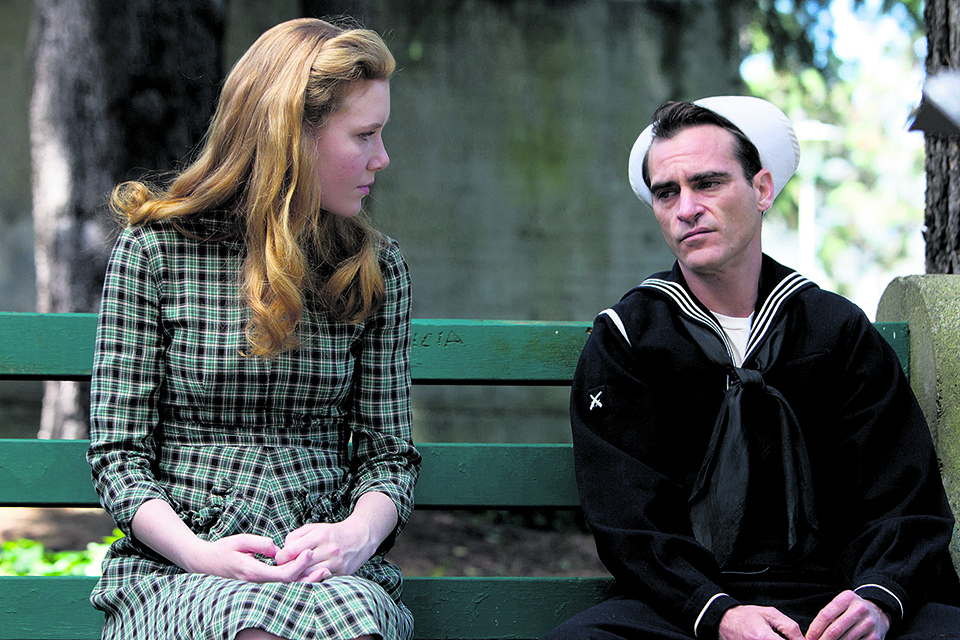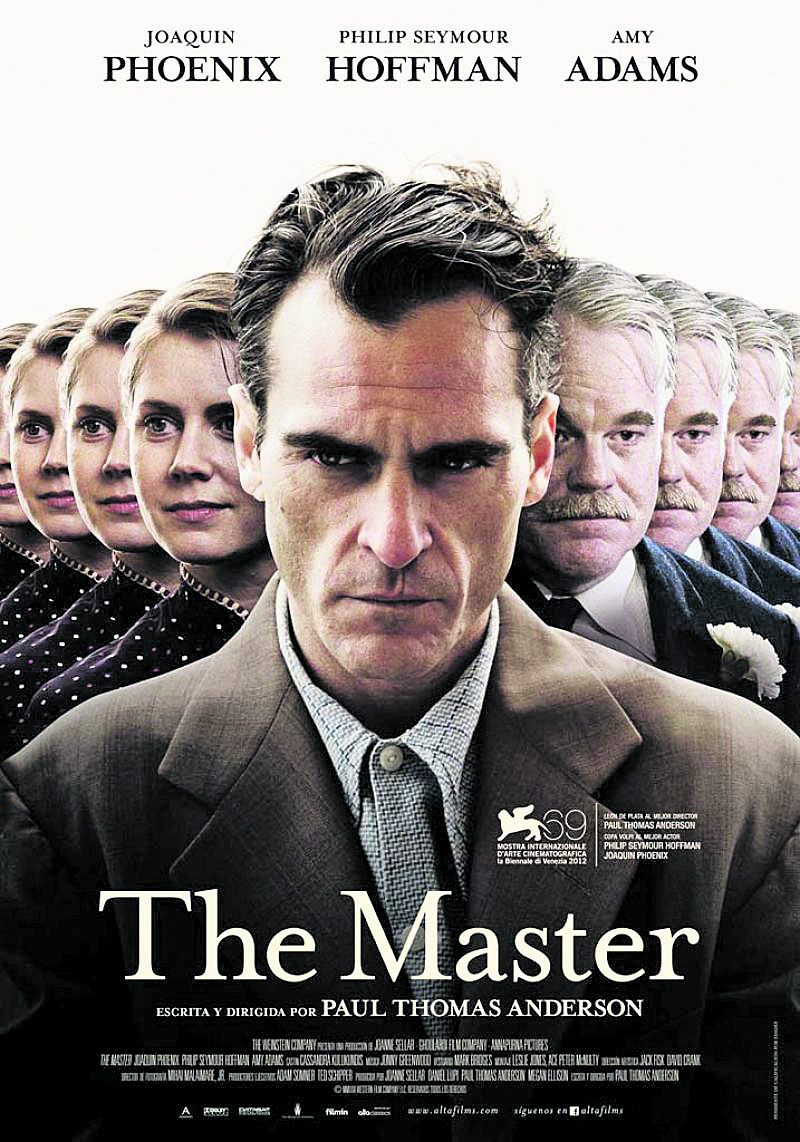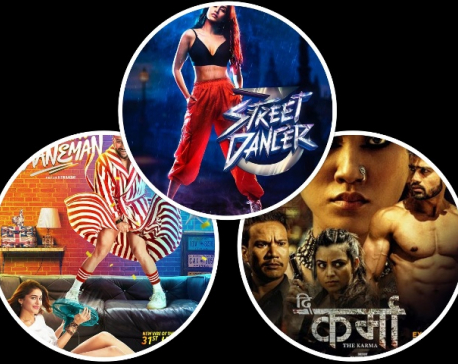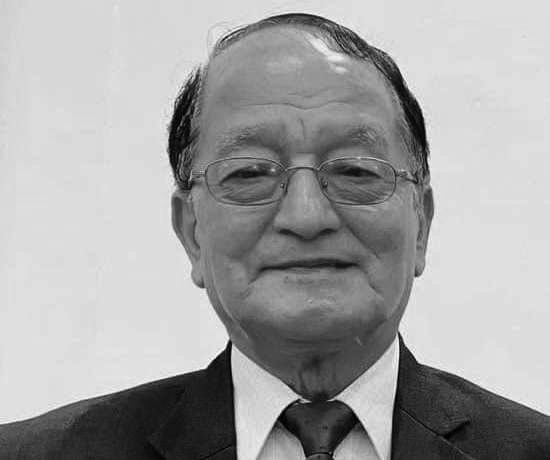
OR

The Master is a 2012 film written and directed by Paul Thomas Anderson (whose film There Will Be Blood was a masterpiece, I think). The film got critical acclaim and was frequently featured in film podcasts and film pages on social media. It was this that prompted me to give it a watch.
The fact that it had a stunning cast – Joaquin Phoenix, Philip Seymour Hoffman and Amy Adams – also played an important role, as with them, especially Phoenix, you know you’re in for a good ride.
The story is not your fast flowing conventional story and, I’ll be honest, it takes an effort to fully focus and understand it. The story follows Joaquin Phoenix as Freddie Quell whose life was wasted away at war and he struggles to find his place in society. Quell is socially awkward, ill tempered, and has not fully recovered from all that has happened to him at war. He often fails to communicate with people around him, has no thought for himself and is a recluse.
Quell meets Hoffman’s character – a charismatic cult leader named Lancaster Dodd, who believes in “The Cause”, a philosophy that believes in time travel and past life, inspired from “Scientology” (which is just this whole other thing). Quell, at first, worships Dodd and is in awe with how he presents himself and his beliefs but he soon realizes that Dodd isn’t as perfect and confident about himself. Amy Adams plays Peggy Dood, Lancaster’s wife, who, at first, might seem like a side character but turns into an important player in this seemingly aloof game.
In the beginning, Dodd comes off as an almost spiritual leader and Quell believes that Dodd’s philosophy might be just what he needs to cure his restless and unhappiness. Quell is a man without a family. He wants to belong wherever he is but he fails to express himself. This is evident when Quell is working as a photographer and the way how he directs families and couples to position themselves feel almost meditative, like he is truly enjoying himself. Quell is also obsessed with “his girl” from his hometown whom he believes to be the one to put him out of his misery. Every time he pins his hopes on being saved by others rather than looking within himself and, thus, he is truly never at peace.
Similarly, the film is a wonderful satire into this mob mentality, i.e. the fact that most people tend to turn a blind eye to any debates or criticisms on their religion or certain beliefs and never really learn to question, reason or think for themselves. In the film, Dodd’s book regarding “The Cause” is criticized by his own pupils but Quell is in denial about Dodd’s incompetence – even though he too doesn’t understand anything and that leads to him beating up anyone who questions Dodd.
Personally, the story felt a little too deep and I couldn’t grasp the concept however much I tried. I’m all for profound meaning in films but here I found little that told me what was going on. There was nothing to show me where the story was headed. This often felt frustrating because going by how well reviewed the film was, I almost felt pressured to like it. But I have to admit that I felt no strong emotion or sense of attachment to any character. They all seemed too shallow for me to assign my emotions to them.
However, the cinematography of the film was superb. Shot on a 65 mm film stock, it became the first fiction feature to be shot and released in 70 mm since Kenneth Branagh’s Hamlet in 1996. And all this hard work made the cinematography worth it. The colors in each scene are bright but it feels natural. The character’s faces have extreme close ups most of the time and the attention to detail is almost uncomfortable.
Whenever characters are talking to one another, it feels like a sort of monologue as other characters are rarely in the shot and it’s as if the director wants us to carefully notice their faces in reaction to the voices around them.
The music, I must say, was fantastic. Nothing can ever go wrong with jazz and as the film was based on the 1950s, it featured songs of the same era artists like Ella Fitzgerald and Helen Forrest and that complemented the scenes really well.
All in all, if you are fond of dark, deep, seemingly light but with a profound statement kind of film, then this might work for you. Otherwise, I must say, it might get hard to keep yourself focused and interested in the story. Phoenix, however, is genius in the film. He portrays that misguided, ill-tempered war veteran so perfectly that it will amaze as well as scare you at the same time. I have to admit that he made The Master worth watching, despite the story not really having worked for me.

You May Like This

Movie review
This movie is based on the lives of street dancers. It shows the competition between two dance groups in London... Read More...

Movie Review: Befikre
It is difficult to imagine Aditya Chopra directing a more successful film than his debut blockbusterDilwale Dulhania Le Jayenge, a saccharine love... Read More...







Just In
- Satdobato-Balkumari road section to be closed at night for several days
- NC objects Gandaki Province assembly call
- Eight Chinese citizens injured in Scorpio-microbus collision in Pokhara
- Former chief secretary Shakya passes away
- UML Chair Oli appeals vote for Nembang
- APF seizes illegally imported 152 sacks of onions and 32 units of mobile phones from Dhansuha
- 80 civil servants left in the lurch as MoFAGA places them in reserve pool
- Weather Alert: Storm likely in Lumbini and Sudurpaschim











Leave A Comment